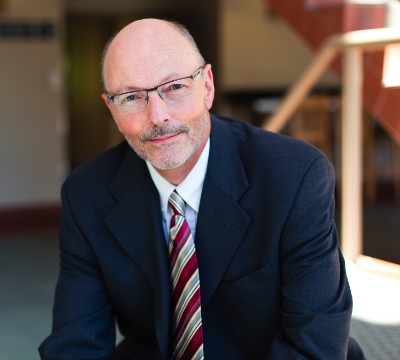
Earl Phillips has taken on the role of executive director of the Trinity Western University School of Law.
The new executive director of Trinity Western University’s proposed law school, Earl Phillips, is a well-regarded labour relations lawyer. He is also a long-time advisor to the Vancouver area’s other evangelical university-level school, Regent College.
Phillips is a former managing partner of a major national law firm, McCarthy Tétrault LLP. And for almost a decade (1992 – 2001) he was a member of the Board of Governors at Regent College, part of that time serving as board chair. Currently, he is a trustee of the Regent College 2000 Foundation.
University President Bob Kuhn, himself a lawyer, has been leading the university through its quest for a law school. He noted that Phillips “is a leader with experience in national legal issues and provides a broad-based perspective, which will assist Trinity Western in refining its proposed high-quality legal education experience. I look forward to working closely with Earl as we plan for the opening of the TWU School of Law in September 2016.”
A Trinity Western press release noted that “in his new role, Phillips will lead the development of the School of Law, and manage operations in preparation for its 2016 opening. As a member of the law school leadership team, he will serve in a strategic role to ensure the law school is on track to give its first Dean a running start in welcoming the first class of 60 students.”
The school is expecting to produce its first graduates in 2019.
The release noted that for 28 years, Phillips was a partner at McCarthy Tétrault LLP, practicing labour and employment law. As the Regional Managing Partner from 2001 – 2004, he provided leadership for 90 lawyers and 100 staff members. From 2002 – 2007, he also served as the National Practice Group Leader in labour and employment, responsible for 50 lawyers across five offices.
“I am drawn to the idea of having a law school that really prepares lawyers for practice,” said Phillips. “Specifically, one that is focused on serving the types of clients that are underserved today and that appreciate law as a serving profession with broad obligations to the communities in which they work, and to our society as a whole.
“I had a very fulfilling legal practice but I was ready for a change,” he added. Phillips retired from full-time practice at the end of 2013 – which happened to coincide with approval for the law school.
Phillips holds a bachelor’s degree in political science from the University of British Columbia and a law degree from the University of Victoria. He has received various recognition awards, including the Client Choice Award for outstanding employment and labour work in British Columbia from International Law Office’s Lexology (2013) and the Queen’s Golden Jubilee Medal (2002).
In 2013, Phillips was recognized as one of The Best Lawyers in Canada in the area of labour and employment law, and has been listed each year since 2011 in the Canadian Legal Expert Directory as a leading lawyer in the area of employment law, labour and workplace human rights.
Despite the fact that the proposed law school received support from the Federation of Law Societies of Canada and the BC Minister of Advanced Education, following extensive reviews, there has been considerable opposition related to Trinity Western’s Community Covenant, which includes a definition of marriage as being between a man and a woman. For more on the proposed school, and the controversy, go to Trinity Western’s School of Law page or to our earlier articles.

